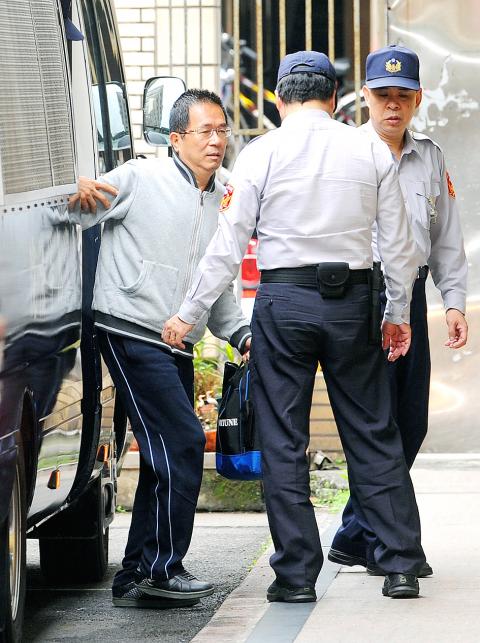US Representative Dan Lungren of the Republican Party has called on the Tom Lantos Human Rights Commission and other House of Representatives members to investigate the imprisonment of former president Chen Shui-bian (陳水扁).
The Tom Lantos Humans Rights Commission is a bipartisan caucus in the US Congress aiming “to promote, defend and advocate internationally recognized human rights norms ... both within and outside of [the US] Congress, as enshrined in the Universal Declaration of Human Rights and other relevant human rights instruments.”
Chen, serving a term of 17-and-a-half years on bribery and corruption charges, has complained of ailing health in recent months. The Democratic Progressive Party (DPP) has been calling for the administration of President Ma Ying-jeou (馬英九) to allow Chen to be given prison leave long enough to visit a hospital and see a doctor.

Photo provided by the Taipei Photojournalists Association.
Chen suffered from acute coronary syndrome last month and was diagnosed with a prostate tumor.
Lungren had sent a letter to the co-chairmen of the commission, Democratic Representative Jim McGovern and Republican Representative Frank Wolf, calling on them to take note of worrying developments these past few weeks about Chen’s gradually worsening health.
The letter cited section 3301 of the Taiwan Relations Act (TRA), claiming a legal basis for the commission to look into Chen’s imprisonment because “The preservation and enhancement of the human rights of all the people on Taiwan are hereby reaffirmed as objectives of the United States,” adding that the commission should strongly encourage Taiwan’s government to let Chen receive adequate medical care outside prison.
Mark Kao (高龍榮), president of the Washington-based Formosan Association for Public Affairs, applauded the motion and called on the commission to inquire into the matter.
Deputy Minister of Justice Chen Shou-huang (陳守煌) was quoted by the Central News Agency as saying that the former president’s health has not deteriorated as his family members claimed, adding that his ministry would be closely monitoring Chen Shui-bian’s health and would pay close attention to his rights.
Chen Shui-bian is serving a sentence handed down by the High Court and everything would be done in accordance with the law, Chen Shou-huang said, adding that the former president’s incarceration was not a matter in which other nations were welcome to interfere.
As for Chen Shui-bian’s family calling on the Ma administration to grant him medical leave, Chen Shou-huang cited Article 58 of the Prison Act (監獄行刑法), saying that unless an inmate has contracted a disease that could not be adequately cared for in prison, and depending on the severity of the situation, the prison administration may contact the Agency of Corrections to apply to have the prisoner sent to a prison hospital or an outside hospital.
The Taipei Prison and the agency would decide whether to give Chen Shui-bian medical leave based on his physical health, Chen Shou-haung said.
Additional Reporting with CNA
Translated by Jake Chung, Staff Writer

SECURITY: As China is ‘reshaping’ Hong Kong’s population, Taiwan must raise the eligibility threshold for applications from Hong Kongers, Chiu Chui-cheng said When Hong Kong and Macau citizens apply for residency in Taiwan, it would be under a new category that includes a “national security observation period,” Mainland Affairs Council (MAC) Minister Chiu Chui-cheng (邱垂正) said yesterday. President William Lai (賴清德) on March 13 announced 17 strategies to counter China’s aggression toward Taiwan, including incorporating national security considerations into the review process for residency applications from Hong Kong and Macau citizens. The situation in Hong Kong is constantly changing, Chiu said to media yesterday on the sidelines of the Taipei Technology Run hosted by the Taipei Neihu Technology Park Development Association. With

CARROT AND STICK: While unrelenting in its military threats, China attracted nearly 40,000 Taiwanese to over 400 business events last year Nearly 40,000 Taiwanese last year joined industry events in China, such as conferences and trade fairs, supported by the Chinese government, a study showed yesterday, as Beijing ramps up a charm offensive toward Taipei alongside military pressure. China has long taken a carrot-and-stick approach to Taiwan, threatening it with the prospect of military action while reaching out to those it believes are amenable to Beijing’s point of view. Taiwanese security officials are wary of what they see as Beijing’s influence campaigns to sway public opinion after Taipei and Beijing gradually resumed travel links halted by the COVID-19 pandemic, but the scale of

A US Marine Corps regiment equipped with Naval Strike Missiles (NSM) is set to participate in the upcoming Balikatan 25 exercise in the Luzon Strait, marking the system’s first-ever deployment in the Philippines. US and Philippine officials have separately confirmed that the Navy Marine Expeditionary Ship Interdiction System (NMESIS) — the mobile launch platform for the Naval Strike Missile — would take part in the joint exercise. The missiles are being deployed to “a strategic first island chain chokepoint” in the waters between Taiwan proper and the Philippines, US-based Naval News reported. “The Luzon Strait and Bashi Channel represent a critical access

Pope Francis is be laid to rest on Saturday after lying in state for three days in St Peter’s Basilica, where the faithful are expected to flock to pay their respects to history’s first Latin American pontiff. The cardinals met yesterday in the Vatican’s synod hall to chart the next steps before a conclave begins to choose Francis’ successor, as condolences poured in from around the world. According to current norms, the conclave must begin between May 5 and 10. The cardinals set the funeral for Saturday at 10am in St Peter’s Square, to be celebrated by the dean of the College